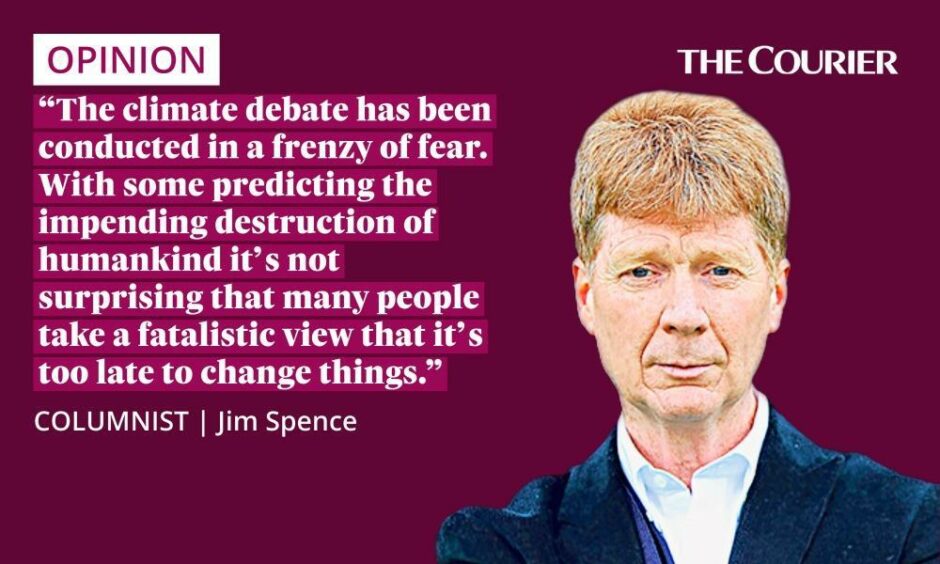When I saw Joe Biden nodding off on the opening day of COP26 I sympathised.
So will most folk who’ve had to sit through work conferences and rooms full of wafflers and wide-boys.
And after watching the diesel-guzzling motorcades and a sky choked with private jets carrying those preaching that we should ditch our gas boilers to install prohibitively expensive ground heaters and give up our cars and take electric bikes to work, some attendees in Glasgow appear to be wider than the Clyde and a lot shallower too.
At least Xi Jinping and Vladimir Putin have had the good grace to give the event a body swerve.

Instead they’ve sent their emissaries to deal with the duplicity of the fact that the Chinese are world leaders in the emission of greenhouse gases with the Russians not far behind.
However, the hypocrisy of lengthy motorcades and retinues of hangers on jetting in doesn’t mean the rest of us should give up trying to help the planet.
We need to find ways to fix the mess we’re in and achieve realistic sustainable changes without reverting back to living in caves and huddling round wood-burning fires roasting grubs on sticks.
Most folk accept the need to do things differently, although the situation hasn’t been helped previously by some in the scientific and green community whose apocalyptic predictions have been wide of the mark.
🚨 | NEW: Biden falling asleep during Cop speeches
— Politics For All (@PoliticsForAlI) November 1, 2021
However, persuading China, India, and Russia and the US, who are the giants of the pollution premier league, to share the pain of poorer countries, and deny themselves their resources of coal and oil and gas, in a grand humanitarian gesture, will require the
Wisdom of Solomon and the Patience of Job.
COP26 is happening in a climate of fear
Greta Thunberg the 18-year-old Swede is in Scotland during COP26 and has led the youthful charge against our rapaciously consumerist society.
There is undoubtedly a moral imperative for each generation to bequeath a better world than the one they themselves inherited.
Although, on occasion, I think her message seems to have whipped some minds into a breathless state of panic, her zealous no-holds-barred approach has caught the mood of many, who are fearful that the planet is doomed and heading for catastrophe.
The climate debate has been conducted in a frenzy of fear.
With some predicting the impending destruction of humankind it’s not surprising that many people take a fatalistic view that it’s too late to change things.
When in Scotland… https://t.co/QmSuLgXQ45
— Greta Thunberg (@GretaThunberg) November 1, 2021
It’s also a pity that the passion for change and concern for our environment has spilled over into hyperbolic comment from those whom we should expect to generate light not heat.
The Archbishop of Canterbury has rightly apologised to Jews for saying that politicians who fail to act on climate change would be cursed and compared them to those who “ignored what was happening in Nazi Germany”.
I’m sure his heart was in the right place but the analogy was ill judged and the kind of rhetoric which detracted from the seriousness of the subject while also causing enormous offence to the Jewish community.
No one solution – but there are solutions
One huge issue with the climate change argument is that alternative views on how to fix things aren’t welcomed by the high priests of the debate who think they’ve cornered the market in certainty.
Thus anyone suggesting for instance that history shows the earth has suffered natural climate change before the age of industrialisation, or that nuclear energy might actually be worth consideration as a safe and clean method to provide for our needs, is shouted down by a righteous mob and treated like the old auntie who farted loudly in the middle of the minister’s sermon.
Rational debate is at a premium but, then again, so is time, argues the green lobby.
If we are truly serious about major change then a hell of a lot of folk are going to be shocked to their core at what we might need to give up and the sort of changes required to our acquisitive and wasteful lifestyles.
I’m all in favour of putting an end to shipping goods from all over the world and moving to a sustainable localised future.
I’m keen on the idea that we make more use of seasonal produce grown at home and that we rebuild industries which have been outsourced, like clothing manufacture and shoe making and a dozen more besides.
I’ll be delighted if we stop ourselves renewing costly mobile phones which don’t need to be upgraded every year and whose production involves the grotesque exploitation of child labour.
And those are just the tip of the iceberg.
If COP26 is to achieve radical and lasting change to our planet it’ll involve turning much of the world that we know upside down.
Are we prepared to embrace the realities of that brave new world?

